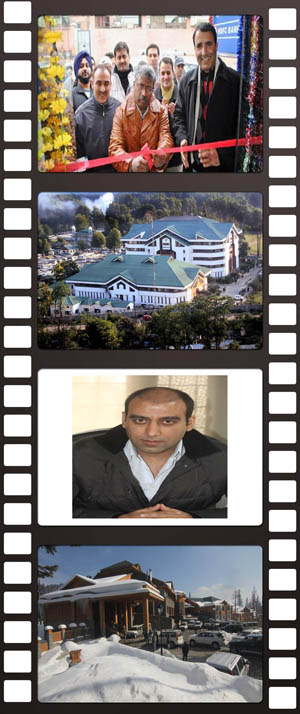Banks are flush with money but quite a few locals are willing to risk and invest in a place ravaged by conflict and turmoil where peace is fragile, RS Gull reports
As they said…“In his (Gen Singh’s) case, I am sorry to say so, he was Commander-in-Chief of the Army. There are, at least in the state of Jammu and Kashmir, massive allegations of rape against Army.”
Wajahat Habibullah, National Minorities Commission Chairman, criticized former Army Chief V K Singh for taking to streets against the gang rape of a girl in Delhi.
Investors generate wealth. They make money, regardless of the constraints of space and time. Last time, when the security grid and the insurgent brotherhood were against the introduction of mobile telephony, telecom players wanted to grab the opportunity. With seven players in the field today, J&K spends more than Rs 1000 crore on talking and talking machines.
A general impression that investors want a peaceful situation to work is untrue. They look at opportunity and return on investment. Sometimes, they milk even strife. HCC, for instance, came to Kashmir at the peak of militancy. Now it is a major implementer of energy and road projects. Ratan Tata, for instance, was on newspaper front-pages when he obliged Rahul Gandhi and flew with biggies to Srinagar, apparently for investment. Tata Tele Services, a TATA subsidiary pulled down the shutters of their shop in J&K once renewing the license became an unviable business proposition. Compared to TATA, the CPSU BSNL is investing Rs 55 crore to add to its infrastructure so that it manages its stagnation.
But peace helps businesses grow. If banking operations is a key for understanding the situation, then people made lot of money in last year. But people are unwilling to take risks and establish business. For 12 months ending September 2012, J&K parked Rs 9576 crore of deposits with 42 banks servicing the state through 1536 branches. But the credit off take was discouraging. In the same period, the overall credit off take involving all sectors is only Rs 3786 crore – slightly more than one-third of the deposits.
 Banking leaders say market has appetite for the services. “We increased our network by around 100 branches this year,” Mushtaq Ahmad, chairman of J&K Bank, the main institution contributing enormously to the overall economy of the state, said. “We will be having more branches; more ATMs and obviously we are working towards a Rs 1000 crore profit in 2013-14 in which our platinum jubilee falls.”
Banking leaders say market has appetite for the services. “We increased our network by around 100 branches this year,” Mushtaq Ahmad, chairman of J&K Bank, the main institution contributing enormously to the overall economy of the state, said. “We will be having more branches; more ATMs and obviously we are working towards a Rs 1000 crore profit in 2013-14 in which our platinum jubilee falls.”
Interestingly, HDFC bank has jumped into the big league and has set up 53 branches as its deposits have soared to nearly Rs 1000 crore. Within a few years, it may land in a status that will kick out nationalized banks like SBI and PNB from their ranking in the state.
But people need willingness to take risk. On the overall tally, it is housing sector that is seeking more funds than industry. But exceptions do exist. Radio taxi introduction this season triggered lot of heat. “At times, the taxi drivers even damaged our cars and beat our drivers,” one of the promoters said. “But we want to make money while making certain changes in the way we live and deliver the services. We are doing it successfully.”
“Most investment is taking place in Lassipora Industrial Estate because it is the only estate having space,” Zahoor Ahmad, who heads the Federation of Chambers of Industries Kashmir (FCIK). “There are a number of controlled atmosphere stores and even one of our major members is busy implementing a synthetic tank unit.”
Impressive tourist footfall resulted in a series of small investments. Kashmir’s major industrial family Khyber Group’s Rs 120 crore Khyber Himalayan Resort and Spa is a major development. One of the best hotels of state, the property is listed in few accredited luxury hotels of the world. “Kashmir is known for tourism and we lacked a luxury brand,” said Umer Khursheed Tramboo, now Khyber’s face. “We are looking at other destinations for infrastructure development.” Interestingly, the promoters did not bother the government, even for a whisker, and the five star luxury hotel is ‘dry’. “If Gujarat can be a dry state, why can’t a hotel in Kashmir survive without selling liquor?” Umer said.
“There are at least two major chains looking for space and tie-ups in Kashmir,” Aijaz Ahmad, one of the old hands in hospitality sector said. “A better tourist year is a huge encouragement to the industry and it is triggering good investment.” ITCs Welcome Group is reportedly reviving its relationship with Nedou’s group, one of the oldest players in the hospitality sector that established hotels in Srinagar and Gulmarg in 1888. Its Srinagar hotel is currently with the paramilitary forces and plans are afoot to repair it.
Even in Jammu the mood is upswing. Vijay Dhar, who runs DPS in Srinagar, has acquired a vast piece of land and is building a major hotel on the airport road. Raju Choudhary, one of Jammu’s major tycoons from the influential KC clan is in the process of identifying a site to have a nice five star in Jammu.
















